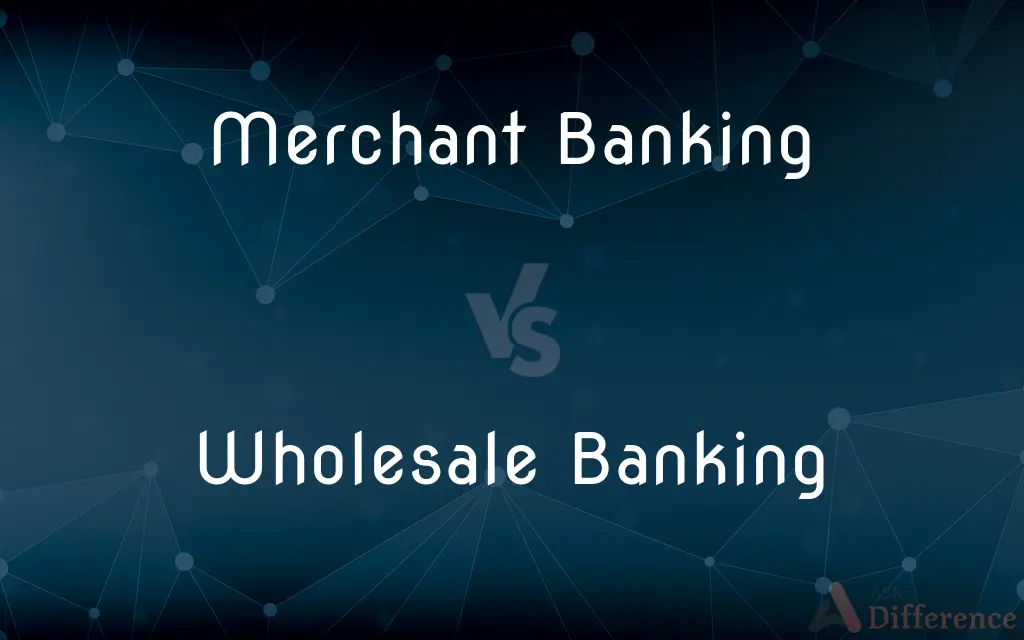Merchant Banking vs. Wholesale Banking — What's the Difference?
By Tayyaba Rehman — Published on October 6, 2023
Merchant Banking involves tailored financial advisory and capital services for businesses, while Wholesale Banking pertains to high-volume, low-margin financial services for large institutional clients.

Difference Between Merchant Banking and Wholesale Banking
Table of Contents
ADVERTISEMENT
Key Differences
Merchant Banking, fundamentally, specializes in offering personalized financial advice and services to corporations and high-net-worth individuals. This primarily encompasses activities related to financial advice for mergers and acquisitions, underwriting, and raising capital for clients. On the other side, Wholesale Banking addresses the financial needs of large institutional clients, providing a range of banking services and products, such as loans, treasury functions, and credit facilities.
Differing in clientele, Merchant Banking largely caters to businesses seeking strategic financial advice and capital raising services, often involving complex financial transactions. In contrast, Wholesale Banking is anchored in providing comprehensive banking solutions to large enterprises, governments, and big institutions, focusing on volume over margin in their transactions.
In the context of products and services, Merchant Banking is frequently associated with private equity, where the bank invests in the client company, offering expert advice and managing corporate client portfolios. Alternatively, Wholesale Banking generally incorporates a wider array of standardized banking services like commercial loans, trade finance, and cash management services, largely neglecting the advisory aspect.
Regarding investment and funding, Merchant Banking takes an active role, occasionally involving direct investment in the client's company and active engagement in its financial strategy development. Wholesale Banking usually refrains from such direct involvement, primarily providing the necessary funds and services without intruding in management or strategic planning.
The risk profile contrasts between the two as well. Merchant Banking can often carry higher risks due to direct investment and close involvement in client businesses, making returns and revenues potentially variable. Conversely, Wholesale Banking tends to maintain a more stable revenue stream, focusing on sheer volume and minimizing risk through diversified services and clients.
ADVERTISEMENT
Comparison Chart
Clientele
Corporations and high-net-worth individuals.
Large institutional clients like big corporations and governments.
Services Provided
Financial advisory, capital-raising, and investment management.
Bulk banking services including loans, treasury, and credit.
Involvement
Actively involves in client’s business strategy and might invest.
Provides services with typically no direct business involvement.
Risk Profile
Potentially higher due to active investments and client involvement.
Relatively lower, focusing on volume and service diversification.
Revenue Generation
Through service fees, and potentially, investment returns.
Through interests, fees, and service charges on a larger scale.
Compare with Definitions
Merchant Banking
Merchant Banking provides financial advisory services.
The company sought Merchant Banking expertise for the merger.
Wholesale Banking
Wholesale Banking offers standardized banking services.
Through Wholesale Banking, the government managed its treasury functions.
Merchant Banking
Merchant Banking often engages in capital-raising activities.
The Merchant Banking sector facilitated the IPO successfully.
Wholesale Banking
Wholesale Banking engages in high-volume transactions.
The Wholesale Banking department managed numerous high-value transactions daily.
Merchant Banking
Merchant Banking may directly invest in client businesses.
The Merchant Banking firm took a stake in the startup.
Wholesale Banking
Wholesale Banking focuses on low-margin, high-volume operations.
Wholesale Banking maintained its profits through extensive, large-scale operations.
Merchant Banking
Merchant Banking involves in-depth client involvement.
Merchant Banking professionals worked closely with the client on the strategy.
Wholesale Banking
Wholesale Banking provides services to large entities.
The corporation utilized Wholesale Banking for its loan needs.
Merchant Banking
Merchant Banking customizes solutions per client.
The Merchant Banking unit developed a bespoke financial model for the firm.
Wholesale Banking
Wholesale Banking typically avoids direct investment in client businesses.
The Wholesale Banking division provided the loan without buying a stake in the company.
Common Curiosities
Do Wholesale Banks offer advisory services similarly to Merchant Banks?
Typically, no. Wholesale Banking primarily offers generalized banking services and doesn’t usually provide the strategic financial advisory services that Merchant Banking does.
Who are the typical clients for Wholesale Banking?
Large institutional clients, such as big corporations, governments, and other large entities, primarily utilize Wholesale Banking.
What primarily distinguishes Merchant Banking from Wholesale Banking?
Merchant Banking provides tailored financial advice and services, while Wholesale Banking offers standard, high-volume financial services to large entities.
Is Merchant Banking involved in client business strategy?
Yes, Merchant Banking often involves providing strategic financial advice and may invest directly in client businesses.
Can Merchant Banking provide assistance in mergers and acquisitions?
Yes, Merchant Banking often aids in providing financial advice and capital services for mergers and acquisitions.
Share Your Discovery

Previous Comparison
American Football vs. Rugby
Next Comparison
Return Inwards vs. Return OutwardsAuthor Spotlight
Written by
Tayyaba RehmanTayyaba Rehman is a distinguished writer, currently serving as a primary contributor to askdifference.com. As a researcher in semantics and etymology, Tayyaba's passion for the complexity of languages and their distinctions has found a perfect home on the platform. Tayyaba delves into the intricacies of language, distinguishing between commonly confused words and phrases, thereby providing clarity for readers worldwide.











































